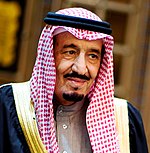Absolute monarchy
This article possibly contains original research. (September 2020) |
| Part of the Politics series |
| Monarchy |
|---|
 |
|
|
| Part of the Politics series |
| Basic forms of government |
|---|
| List of forms of government |
|
|
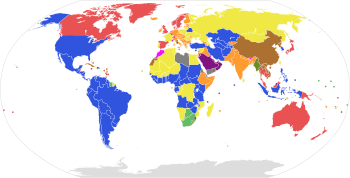
|
2 Several states constitutionally deemed to be multiparty republics are broadly described by outsiders as authoritarian states. This map presents only the de jure form of government, and not the de facto degree of democracy.
Absolute monarchy[1][2] (or absolutism as doctrine) is a form of monarchy in which the monarch holds supreme autocratic authority, principally not being restricted by written laws, legislature, or unwritten customs.[3] These are often hereditary monarchies. In contrast, in constitutional monarchies, the head of state's authority derives from or is legally bound or restricted by a constitution, legislature or unwritten customs.[3]


The widespread concept absolute monarchy in Europe declined substantially after the French Revolution and World War I, which promoted theories of government based on the notion of popular sovereignty.
Some monarchies have a weak or symbolic legislature and other governmental bodies which the monarch can alter or dissolve at will. Countries where monarchs still maintain absolute power are Brunei, Eswatini, Oman, Saudi Arabia, Vatican City and the individual emirates composing the United Arab Emirates, which itself is a federation of such monarchies – a federal monarchy.[4][5][6][7][8][9][10]
Historical examples of absolute monarchies[]
Outside Europe[]
In Ancient Egypt, the Pharaoh wielded absolute power over the country and was considered a living god by his people. In ancient Mesopotamia, many rulers of Assyria, Babylonia and Sumer were absolute monarchs as well. In ancient and medieval India, rulers of the Maratha, Maurya, Satavahana, Gupta, Chola, Mughal, and Chalukya Empires, as well as other major and minor empires, were considered absolute monarchs. In Maratha Empire, the emperors were called Chhatrapati ' Lord of Parasol' . Like that the Khmer Empire, the kings were called Devaraja 'god-king' and Chakravartin, and exercised absolute power over the empire and people.
Throughout Imperial China, many emperors and one empress (Wu Zetian) wielded absolute power through the Mandate of Heaven. In pre-Columbian America, the Inca Empire was ruled by a Sapa Inca, who was considered the son of Inti, the sun god and absolute ruler over the people and nation. Korea under the Joseon dynasty and short-lived empire was also an absolute monarchy.[11]
Ottoman Empire[]
In the Ottoman Empire, many sultans wielded absolute power through heavenly mandates reflected in their title, the "Shadow of God on Earth".
Europe[]
Throughout much of European history, the divine right of kings was the theological justification for absolute monarchy. Many European monarchs claimed supreme autocratic power by divine right, and that their subjects had no rights to limit their power. James VI and I and his son Charles I tried to import this principle into Scotland and England. Charles I's attempt to enforce episcopal polity on the Church of Scotland led to rebellion by the Covenanters and the Bishops' Wars, then fears that Charles I was attempting to establish absolutist government along European lines was a major cause of the English Civil War, despite the fact that he did rule this way for 11 years starting in 1629, after dissolving the Parliament of England for a time. The Revolutions of 1848, known in some countries as the Springtime of the Peoples[12] or the Springtime of Nations, were a series of political upheavals throughout Europe in 1848. It remains the most widespread revolutionary wave in European history. By the 19th century, divine right was regarded as an obsolete theory in most countries in the Western world, except in Russia where it was still given credence as the official justification for the Tsar's power until February Revolution in 1917.
Denmark–Norway[]
Absolutism was underpinned by a written constitution for the first time in Europe in 1665 Kongeloven, 'King's Law' of Denmark–Norway, which ordered that the Monarch
shall from this day forth be revered and considered the most perfect and supreme person on the Earth by all his subjects, standing above all human laws and having no judge above his person, neither in spiritual nor temporal matters, except God alone.[13][14]
This law consequently authorized the king to abolish all other centers of power. Most important was the abolition of the Council of the Realm in Denmark. Absolute monarchy lasted until 1814 in Norway, and 1848 in Denmark.
Habsburgs[]
This section needs expansion. You can help by . (August 2021) |
Hungary[]
This section needs expansion. You can help by . (August 2021) |
France[]
This section contains weasel words: vague phrasing that often accompanies biased or unverifiable information. (December 2019) |
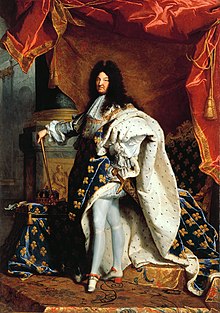
Though some historians[who?] doubt it, Louis XIV of France (1638–1715) is often said to have proclaimed L'état, c'est moi!, 'I am the State!'.[15] Although often criticized for his extravagances, such as the Palace of Versailles, he reigned over France for a long period, and some historians consider him a successful absolute monarch. More recently, revisionist historians[who?] have questioned whether Louis' reign should be considered 'absolute',[example needed] given the reality of the balance of power between the monarch and the nobility, as well as parliaments.[16][need quotation to verify] A theory tells that that he built opulent palace of Versailles, and give preferment only to nobles who live in them to gather nobility in Paris and to concentrate power as centralized government. This policy also add effect in separating nobles and their feudal army.
The King of France concentrated legislative, executive, and judicial powers in his person. He was the supreme judicial authority. He could condemn people to death without the right of appeal. It was both his duty to punish offenses and stop them from being committed. From his judicial authority followed his power both to make laws and to annul them.[17]
Prussia[]
In Brandenburg-Prussia, the concept of absolute monarch took a notable turn from the above with its emphasis on the monarch as the "first servant of the state", but it also echoed many of the important characteristics of absolutism. Frederick William (r. 1640–1688), known as the Great Elector, used the uncertainties of the final stages of the Thirty Years' War[citation needed] to consolidate his territories into the dominant kingdom in northern Germany, whilst increasing his power over his subjects. His actions largely originated the militaristic streak of the Hohenzollerns.
In 1653, the Diet of Brandenburg met for the last time and gave Frederick William the power to raise taxes without its consent, a strong indicator of absolutism.[disputed ] Frederick William enjoyed support from the nobles, who enabled the Great Elector to undermine the Diet and other representative assemblies. The leading families saw their future in cooperation with the central government and worked to establish absolutist power.
The most significant indicator of the nobles' success was the establishment of two tax rates – one for the cities and the other for the countryside – to the great advantage of the latter, which the nobles ruled. The nobles served in the upper levels of the elector's army and bureaucracy, but they also won new prosperity for themselves. The support of the Elector enabled the imposition of serfdom and the consolidation of land holdings into vast estates which provided for their wealth.
They became known as Junkers (from the German for young lord, junger Herr). Frederick William faced resistance from representative assemblies and long-independent cities in his realm. City leaders often revolted at the imposition of Electorate authority. The last notable effort was the uprising of the city of Königsberg which allied with the Estates General of Prussia to refuse to pay taxes. Frederick William crushed this revolt in 1662, by marching into the city with thousands of troops. A similar approach was used with the towns of Cleves.[18]
Russia[]
Until 1905, the Tsars and Emperors of Russia governed as absolute monarchs. Ivan the Terrible was known for his reign of terror through oprichnina. Peter I the Great reduced the power of the Russian nobility and strengthened the central power of the monarch, establishing a bureaucracy and a police state. This tradition of absolutism, known as Tsarist autocracy, was expanded by Catherine II the Great and her descendants. Although Alexander II made some reforms and established an independent judicial system, Russia did not have a representative assembly or a constitution until the 1905 Revolution. However, the concept of absolutism was so ingrained in Russia that the Russian Constitution of 1906 still described the monarch as an autocrat. Russia became the last European country (excluding Vatican City) to abolish absolutism, and it was the only one to do so as late as the 20th century (the Ottoman Empire drafted its first constitution in 1876).
Sweden[]
The form of government instituted in Sweden under King Charles XI and passed on to his son, Charles XII is commonly referred to as absolute monarchy; however, the Swedish monarch was never absolute in the sense that he wielded arbitrary power. The monarch still ruled under the law and could only legislate in agreement with the Riksdag of the Estates; rather, the absolutism introduced was the monarch's ability to run the government unfettered by the privy council, contrary to earlier practice. The absolute rule of Charles XI was instituted by the crown and the Riksdag in order to carry out the Great Reduction which would have been made impossible by the privy council which comprised the high nobility.
After the death of Charles XII in 1718, the system of absolute rule was largely blamed for the ruination of the realm in the Great Northern War, and the reaction tipped the balance of power to the other extreme end of the spectrum, ushering in the Age of Liberty. After half a century of largely unrestricted parliamentary rule proved just as ruinous, King Gustav III seized back royal power in the coup d'état of 1772, and later once again abolished the privy council under the Union and Security Act in 1789, which, in turn, was rendered void in 1809 when Gustav IV Adolf was deposed in a coup and the constitution of 1809 was put in its place. The years between 1789 and 1809, then, are also referred to as a period of absolute monarchy.
Contemporary trends[]
This section needs additional citations for verification. (May 2015) |
Many nations formerly with absolute monarchies, such as Jordan, Kuwait and Morocco, have moved towards constitutional monarchy, although in these cases the monarch still retains tremendous power, to the point that the parliament's influence on political life is negligible.[citation needed]
In Bhutan, the government moved from absolute monarchy to constitutional monarchy following planned parliamentary elections to the Tshogdu in 2003, and the election of a National Assembly in 2008.
Nepal had several swings between constitutional rule and direct rule related to the Nepalese Civil War, the Maoist insurgency, and the 2001 Nepalese royal massacre, with the Nepalese monarchy being abolished on 28 May 2008.[19]
In Tonga, the King had majority control of the Legislative Assembly until 2010.
Liechtenstein has moved towards expanding the power of the monarch: the Prince of Liechtenstein was given expanded powers after a referendum amending the Constitution of Liechtenstein in 2003, which led the BBC to describe the prince as an "absolute monarch again".[20]
The ruling Kim family in North Korea (Kim Il-sung, Kim Jong-il and Kim Jong-un) has been described as a de facto absolute monarchy or a "hereditary dictatorship". In 2013, Clause 2 of Article 10 of the new edited Ten Fundamental Principles of the Korean Workers' Party states that the party and revolution must be carried "eternally" by the "Baekdu (Kim's) bloodline". This though does not mean it is a de jure absolute monarchy, as the country's name is the Democratic Republic of Korea. It more accurate to call North Korea a hereditary dictatorship because the country is a Republic.
The al-Assad ruling Syria (Hafez al-Assad and Bashar al-Assad ) have also been described as a de facto absolute monarchy or a "hereditary dictatorship". After the death of Hafez Al-Assad in 2000, the Constitution of Syria was amended for the minimum age of the President to change from 40 to 34, which allowed 34 year old Bashar al-Assad to become president. This though does not mean it is a de jure absolute monarchy, as the country's name is the Syrian Arab Republic. It is more accurage to call Syria a hereditary dictatorship because the country is a Republic.
Current absolute monarchies[]
De jure[]
| Realm | Image | Monarch | Born | Age | Reign Since | Reign Length | Succession | Ref(s) |
|---|---|---|---|---|---|---|---|---|
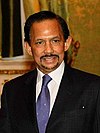 |
Sultan Hassanal Bolkiah | 15 July 1946 | 75 years, 59 days | 4 October 1967 | 53 years, 343 days | Hereditary | [21] | |
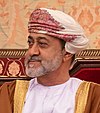 |
Sultan Haitham bin Tariq Al Said | 11 October 1954 | 66 years, 336 days | 11 January 2020 | 1 year, 244 days | Hereditary | [22][23] | |
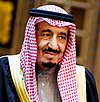 |
King Salman bin Abdul‘aziz | 31 December 1935 | 85 years, 255 days | 23 January 2015 | 6 years, 232 days | Hereditary and elective | [24] | |
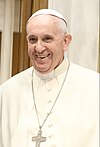 |
Pope Francis | 17 December 1936 | 84 years, 269 days | 13 March 2013 | 8 years, 183 days | Elective | [25] | |
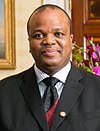 |
King Mswati III | 19 April 1968 | 53 years, 146 days | 25 April 1986 | 35 years, 140 days | Hereditary and elective | [26] |
De facto[]
| Realm | Image | Monarch | Born | Age | Reign Since | Reign Length | Succession | Ref(s) |
|---|---|---|---|---|---|---|---|---|
 |
Emir Tamim bin Hamad | 3 June 1980 | 41 years, 101 days | 25 June 2013 | 8 years, 79 days | Hereditary | [29] |
Saudi Arabia[]
Saudi Arabia is an absolute monarchy, and according to the Basic Law of Saudi Arabia adopted by Royal Decree in 1992, the King must comply with Shari'a (Islamic law) and the Qur'an.[6] The Qur'an and the body of the Sunnah (traditions of the Islamic prophet, Muhammad) are declared to be the Kingdom's Constitution, but no written modern constitution has ever been promulgated for Saudi Arabia, which remains the only Arab nation where no national elections have ever taken place since its founding.[30][31] No political parties or national elections are permitted and according to The Economist's 2010 Democracy Index, the Saudi government is the eighth most authoritarian regime from among the 167 countries rated.[32][6]
Scholarship[]
There is a considerable variety of opinion by historians on the extent of absolutism among European monarchs. Some, such as Perry Anderson, argue that quite a few monarchs achieved levels of absolutist control over their states, while historians such as Roger Mettam dispute the very concept of absolutism.[33] In general, historians who disagree with the appellation of absolutism argue that most monarchs labeled as absolutist exerted no greater power over their subjects than any other non-absolutist rulers, and these historians tend to emphasize the differences between the absolutist rhetoric of monarchs and the realities of the effective use of power by these absolute monarchs. Renaissance historian William Bouwsma summed up this contradiction:
Nothing so clearly indicates the limits of royal power as the fact that governments were perennially in financial trouble, unable to tap the wealth of those ablest to pay, and likely to stir up a costly revolt whenever they attempted to develop an adequate income.[34]
— William Bouwsma
Anthropology, sociology, and ethology as well as various other disciplines such as political science attempt to explain the rise of absolute monarchy ranging from extrapolation generally, to certain Marxist explanations in terms of the class struggle as the underlying dynamic of human historical development generally and absolute monarchy in particular.
In the 17th century, French legal theorist Jean Domat defended the concept of absolute monarchy in works such as "On Social Order and Absolute Monarchy", citing absolute monarchy as preserving natural order as God intended.[35] Other intellectual figures who have supported absolute monarchy include Thomas Hobbes and Charles Maurras.
See also[]
- Autocracy
- Authoritarianism
- Constitutional monarchy
- Criticism of monarchy
- Democracy
- Despotism
- Dictatorship
- Enlightened absolutism
- Family dictatorship
- Jacques Bossuet
- Monarchomachs
- Theonomy
- Thomas Hobbes
- Totalitarianism
- Tyranny
References[]
- ^ Goldie, Mark; Wokler, Robert (2006-08-31). "Philosophical kingship and enlightened despotism". The Cambridge History of Eighteenth-Century Political Thought. Cambridge University Press. p. 523. ISBN 9780521374224. Retrieved 13 January 2016.
- ^ Leopardi, Giacomo (2013) [original 1898]. Zibaldone. Farrar Straus Giroux. p. 1438. ISBN 978-0374296827.
- ^ Jump up to: a b Nathanial Harris (2009). Systems of Government Monarchy. Evans Brothers. p. 10. ISBN 978-0-237-53932-0.
- ^ Stephens, Michael (2013-01-07). "Qatar: regional backwater to global player". BBC News.
- ^ "Q&A: Elections to Oman's Consultative Council". BBC News. 2011-10-13.
- ^ Jump up to: a b c Cavendish, Marshall (2007). World and Its Peoples: the Arabian Peninsula. p. 78. ISBN 978-0-7614-7571-2.
- ^ "Swaziland profile". BBC News. 2018-09-03.
- ^ "State Departments". Vaticanstate.va. Archived from the original on 2013-11-02. Retrieved 2014-01-25.
- ^ "Vatican to Emirates, monarchs keep the reins in modern world". The Times of India. Archived from the original on 2013-10-16.
- ^ "State Departments". www.vaticanstate.va. Archived from the original on 2020-04-11. Retrieved 2019-09-21.
- ^ Choi, Sang-hun (27 October 2017). Interior Space and Furniture of Joseon Upper-class Houses. Ewha Womans University Press. p. 16. ISBN 9788973007202 – via Google Books.
Joseon was an absolute monarchy
- ^ Merriman, John, A History of Modern Europe: From the French Revolution to the Present, 1996, p. 715
- ^ "Kongeloven af 1665" (in Danish). Danske konger. Archived from the original on 2012-03-30.
- ^ A partial English translation of the law can be found in Ernst Ekman, "The Danish Royal Law of 1665" pp. 102-107 in: The Journal of Modern History, 1957, vol. 2.
- ^ "Louis XIV". HISTORY. Retrieved 2018-10-05.
- ^ Mettam, R. Power and Faction in Louis XIV's France, Oxford: Basil Blackwell, 1988.
- ^ Mousnier, R. The Institutions of France under the Absolute Monarchy, 1598-2012 V1. Chicago: The University of Chicago Press, 1979.
- ^ The Western Experience, Seventh Edition, Boston: McGraw-Hill, 1999.
- ^ Sharma, Gopal (2008-05-29). "Nepal abolishes centuries-old Hindu monarchy". Reuters. Retrieved 2020-12-01.
- ^ "Liechtenstein prince wins powers". BBC News. 2003-03-16. Retrieved 2015-10-26.
- ^ Government of Brunei. "Prime Minister". The Royal Ark. Office of the Prime Minister. Archived from the original on 7 October 2011. Retrieved 12 November 2011.
- ^ Sultan Qaboos Centre for Islamic Culture. "About H.M the Sultan". Government of Oman, Diwan of the Royal Court. Archived from the original on 18 January 2012. Retrieved 12 November 2011.
- ^ Nyrop, Richard F (2008). Area Handbook for the Persian Gulf States. Wildside Press LLC. p. 341. ISBN 978-1-4344-6210-7.
- ^ "Saudi Arabia's King Abdullah dies". BBC News. 23 January 2015. Retrieved 23 January 2015.
- ^ "Argentina's Jorge Mario Bergoglio elected Pope". BBC News. Retrieved 13 March 2013.
- ^ Simelane, H.S. (2005), "Swaziland: Mswati III, Reign of", in Shillington, Kevin (ed.), Encyclopedia of African history, 3, Fitzroy Dearborn, pp. 1528–30, 9781579584559
- ^ BBC News, How democratic is the Middle East?, 9 September 2005.
- ^ United States Department of State Country Reports on Human Rights Practices for 2011: Qatar, 2011.
- ^ Government of Qatar. "H.H. The Amir's Biography". Diwan of the Amiri Court. Archived from the original on 2 December 2011. Retrieved 12 November 2011.
- ^ Robbers, Gerhard (2007). Encyclopedia of world constitutions, Volume 1. p. 791. ISBN 978-0-8160-6078-8.
- ^ "Qatar elections to be held in 2013 - Emir". BBC News. BBC. Archived from the original on 2012-01-06. Retrieved 27 February 2021.
- ^ The Economist Intelligence Unit. "The Economist Democracy Index 2010" (PDF). The Economist. Retrieved 6 June 2011.
- ^ Mettam, Roger. Power and Faction in Louis XIV's France, 1991.
- ^ Bouwsma, William J., in Kimmel, Michael S. Absolutism and Its Discontents: State and Society in Seventeenth-Century France and England. New Brunswick, NJ: Transaction Books, 1988, 15
- ^ "Jean Domat: On Defense of Absolute Monarchy - Cornell College Student Symposium". 18 April 2009.
Further reading[]
- Anderson, Perry. Lineages of the Absolutist State. London: Verso, 1974.
- Beloff, Max. The Age of Absolutism From 1660 to 1815 (1961)
- Blum, Jerome, et al. The European World (vol 1 1970) pp 267–466
- ——. Lord and Peasant in Russia from the Ninth to the Nineteenth Century. Princeton, NJ: Princeton University Press, 1951.
- Kimmel, Michael S. Absolutism and Its Discontents: State and Society in Seventeenth-Century France and England. New Brunswick, NJ: Transaction Books, 1988.
- Méttam, Roger. Power and Faction in Louis XIV's France. New York: Blackwell Publishers, 1988.
- Miller, John (ed.). Absolutism in Seventeenth Century Europe. New York: Palgrave Macmillan, 1990.
- Wilson, Peter H. Absolutism in Central Europe. New York: Routledge, 2000.
- Zmohra, Hillay. Monarchy, Aristocracy, and the State in Europe - 1300-1800. New York: Routledge, 2001
- Monarchy
- Political theories
